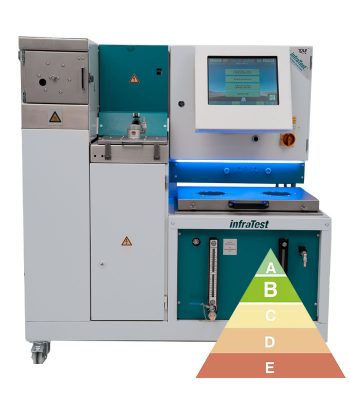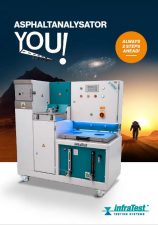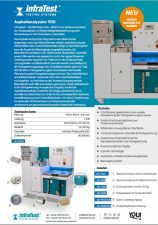Polymer- and rubber-modified binders
In order to meet the current requirements for asphalt pavement quality, properties of the bitumen available on market today are often modified by adding polymers, rubber or other admixtures and additives. With the equipment available today for extraction and recovery, it has often been impossible to make tests of the asphalt mixes made with the use of such binders with achievement of satisfactory quality of the test results. The advanced new asphalt tester PG with an innovative additional unit for extraction of polymer- and rubber-modified asphalt mixes has solved this problem, allowing to do the extraction in a closed cycle, as well as recover the binders from such kinds of mixes.

Our Asphaltanalysator
Solvents
Trichloroethylene is the solvent most frequently used for extraction of asphalt mixes, which is classified by the European Chemicals Agency (ECHA) as a Substance of Very High Concern (SVHC). Presumably, this implies that in future it will only be possible to use this solvent subject to specific conditions, and only with respective permission received in accordance with the EU Regulation that governs the registration, evaluation, authorization, and restriction of use of chemicals. So far it is hard to say whether it will be really mandatory to get a special permission for its use in an asphalt tester. We explore this problem beforehand by elaborating a wide development program. On one hand, this means innovative improvement of the existing asphalt tester so that such units could be reequipped or retrofitted at low cost to be able to work with other nonflammable solvents that could be used without any special permissions, such as, for example, tetrachloroethylene or methylene chloride.
Moreover, the new generation T analyzer with a touchscreen first of all offers a whole lot of new capabilities, such as:
- making and saving test programs
for diverse mix types - visualization of the program execution
- saving process-critical testing parameters (duration, temperatures, etc.)
- faultfinding on the spot or remote service via Internet
- operation and control of the analyzer with optional Polygum 20-11100 unit
- connectivity for other instruments, for example, scales
- program updates / easy switching of solvent types, e.g. using a USB storage




